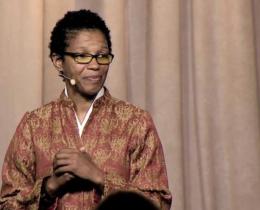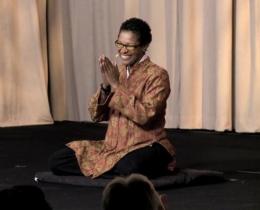About three decades ago I spent a year as a Buddhist monk in Thailand. It was a very austere life, dedicated to meditation and simplicity. One of the trainings I practiced was to only take one meal a day from the food collected going on alms rounds early in the morning.
I would arrange my monk’s robes, walk alone across rice fields to a nearby village, where humble folk would place various little bits of foods such as rice and vegetables in my monk's bowl. I would silently return to the monastery and quietly, slowly, eat the food. Often it was not very tasty by my American standards, but I was grateful to receive this one source of physical nourishment a day to keep me going.
After some months of practicing intensive meditation (mindfulness practice) I began to notice that although the food didn’t taste "good" (the vegetables were often overcooked in heavy oil, and the spicing was way too strong for my taste), I began to really enjoy it, even more so than my mom’s amazing home cooking.
Could it have been so very satisfying because it was my one meal of the day, and with no other sources of entertainment this was my one chance for some sense pleasure?
Perhaps there was a bit of this, but why then did the enjoyment get stronger as my meditation practice deepened? Was there a direct relationship between my meditation practice—which consisted of an ancient but very simple practice of bringing full care and attention into everything that I did—and the level of enjoyment I received?
It was many years later, back in the United States after the better part of a decade in Asia on spiritual sojourn, that I finally figured it out.
Have you ever been at a fancy meal that you looked forward to, and the food was great, but the experience was not all that satisfying? Perhaps your mind was on dessert while you ate the main course, or caught up in comparing this food with some other dish you’d had in the past.
John Lennon said, “Life is what happens to you while you're busy making other plans.” Each day we wake up and go through our day, but are we really there for the moments of our lives? Do we notice if we are there or not? Do we even care?
When I was a monk I wasn’t making other plans while I was eating those meals. I was just eating, really just bringing full care and attention into each bite.
Perhaps the cynic would say that I had nothing better to do than practice mindfulness—I was a monk; what else did I have to do in those moments?
But I am no longer a monk, and haven’t been for over 25 years. I have a wife, a stepson, a house, a nonprofit meditation center to run, lots of teaching responsibilities, finances to think about, etc., so I could easily say I have no time to be mindful.
I would be wrong.
The word mindfulness is derived from an ancient Buddhist meditative term that is translated in two ways. The first is that mindfulness is nonjudgmental present moment awareness, and second is that it is remembering to come back to the task at hand, and reconnecting with it in a clear and accepting way.
Life is what happens when we are not obsessed with, and caught up in, making other plans. It doesn’t mean that we don’t make plans, but that we are not trapped and depleted by the repetitive thoughts of our minds. Mindfulness is another kind of intelligence not based on thought. It complements thinking beautifully, and nourishes us in a way that just taking care of the business of our lives cannot.
The experience I had eating as a monk showed me that as I was sustaining my body with food, I was simultaneously capable of nourishing my heart and mind simply through the quality of attention that I brought to the activity.
The insight that I had based on experience of so many years ago in a monastery in Thailand continues to bear fruit today.
If we take a close look back at the most valuable moments in our life—the real ones, the personal ones, the deeply fulfilling ones—I would venture to say that there is one thing that stands out in all of them. We were there for them, really truly there.
The more care and balanced attention we bring into the actions of our day-to-day lives, the more life gives back to us. I do not mean it necessarily gives back in terms of any ideals we may have of success, but that it gives back in the quality of connection, resilience, quiet dignity, inner peace, and joy that we experience in the moments of our lives. When we are more available for life, it becomes more available to us.
Simple Practices to Nourish Mindfulness
You can learn to nourish the quality of your attention by bringing simple mindfulness practices into everyday activities. Here are a few examples:
- When nourishing the body, try paying attention to eating slowly and notice everything about the process as you do so
- When taking care of the body through exercise, bring your attention back into the actual sensations of the activity instead of going off in thought much of the time, or learn to be aware of your breath in a physical activity
- When driving you can spend some time really being present with the sensations of touching the wheel or sitting on the seat
- When having a conversation with a friend or family member, try pausing and just listening from time to time, and see what happens
Mindfulness is a clear presence of mind and heart, and can be developed by anyone who cares to explore the possibility that nourishment comes not only from the thing itself but the quality of the attention we bring to the simple day-to-day activities of our lives.
After all what is life but many, many moments of being alive?



